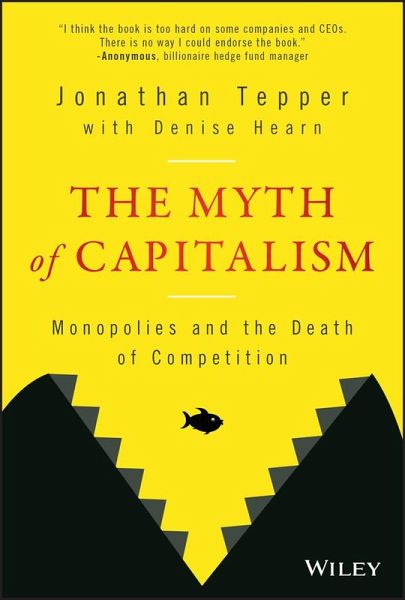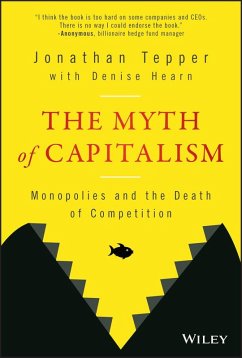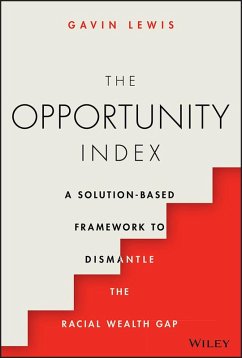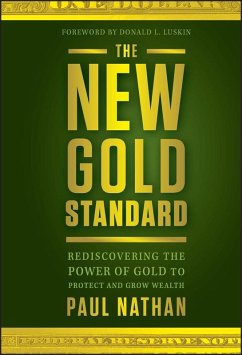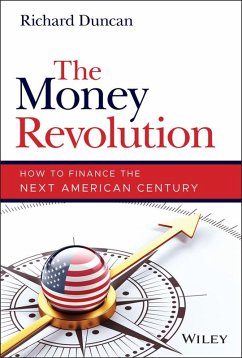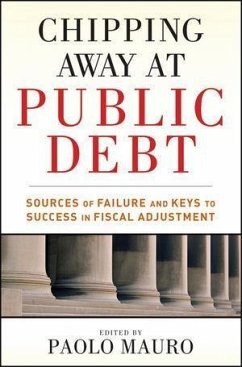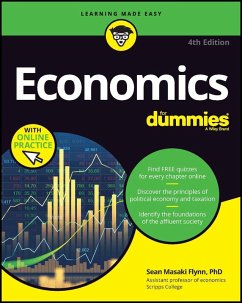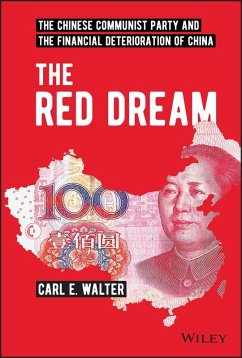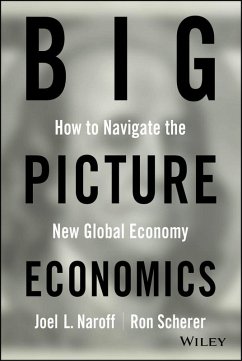Jonathan Tepper
eBook, ePUB
The Myth of Capitalism (eBook, ePUB)
Monopolies and the Death of Competition

PAYBACK Punkte
0 °P sammeln!






The Myth of Capitalism tells the story of how America has gone from an open, competitive marketplace to an economy where a few very powerful companies dominate key industries that affect our daily lives. Digital monopolies like Google, Facebook and Amazon act as gatekeepers to the digital world. Amazon is capturing almost all online shopping dollars. We have the illusion of choice, but for most critical decisions, we have only one or two companies, when it comes to high speed Internet, health insurance, medical care, mortgage title insurance, social networks, Internet searches, or even consume...
The Myth of Capitalism tells the story of how America has gone from an open, competitive marketplace to an economy where a few very powerful companies dominate key industries that affect our daily lives. Digital monopolies like Google, Facebook and Amazon act as gatekeepers to the digital world. Amazon is capturing almost all online shopping dollars. We have the illusion of choice, but for most critical decisions, we have only one or two companies, when it comes to high speed Internet, health insurance, medical care, mortgage title insurance, social networks, Internet searches, or even consumer goods like toothpaste. Every day, the average American transfers a little of their pay check to monopolists and oligopolists. The solution is vigorous anti-trust enforcement to return America to a period where competition created higher economic growth, more jobs, higher wages and a level playing field for all. The Myth of Capitalism is the story of industrial concentration, but it matters to everyone, because the stakes could not be higher. It tackles the big questions of: why is the US becoming a more unequal society, why is economic growth anemic despite trillions of dollars of federal debt and money printing, why the number of start-ups has declined, and why are workers losing out.
Dieser Download kann aus rechtlichen Gründen nur mit Rechnungsadresse in D ausgeliefert werden.
Jonathan Tepper is the Chief Investment Officer at Prevatt Capital. Jonathan is the founder of Variant Perception. Formerly, he was an analyst at SAC Capital and a Vice President on the proprietary trading desk at Bank of America. Jonathan earned a BA with Highest Honors in History and Economics from the University of North Carolina at Chapel Hill, and a M.Litt. in Modern History from the University of Oxford. Jonathan is a Rhodes Scholar.
Denise Hearn is a writer, researcher and project catalyzer focused on how money and power manifest in economic and financial systems. She advises governments, financial institutions, companies, and nonprofits on economic policy and new economic thinking. Denise is a Senior Fellow at the American Economic Liberties Project, and her writing has been featured in publications such as: The Financial Times, The Globe and Mail, Fortune, and The Washington Post. Denise has an MBA from the Oxford Saïd Business School and a BA from Baylor University.
Denise Hearn is a writer, researcher and project catalyzer focused on how money and power manifest in economic and financial systems. She advises governments, financial institutions, companies, and nonprofits on economic policy and new economic thinking. Denise is a Senior Fellow at the American Economic Liberties Project, and her writing has been featured in publications such as: The Financial Times, The Globe and Mail, Fortune, and The Washington Post. Denise has an MBA from the Oxford Saïd Business School and a BA from Baylor University.
Produktdetails
- Verlag: John Wiley & Sons
- Erscheinungstermin: 20. November 2018
- Englisch
- ISBN-13: 9781119548140
- Artikelnr.: 56980772
Financial Times Best Books of 2018: Economics
"I think the book is too hard on some companies and CEOs. There is no way I could endorse the book."
-Anonymous, billionaire hedge fund manager
"'Capitalism without competition is not capitalism,' writes Jonathan Tepper in The Myth of Capitalism. He is right. After decades when most economists dismissed antitrust actions as superfluous so long as consumers were not the victims of price-gouging, we are slowly waking up to the reality that monopoly capitalism is back -- and it can be harmful even if its core products (as in the case of Google and Facebook) are free. But it's not just Big Tech that's killing competition. As Tepper shows in this engagingly written polemic,
"I think the book is too hard on some companies and CEOs. There is no way I could endorse the book."
-Anonymous, billionaire hedge fund manager
"'Capitalism without competition is not capitalism,' writes Jonathan Tepper in The Myth of Capitalism. He is right. After decades when most economists dismissed antitrust actions as superfluous so long as consumers were not the victims of price-gouging, we are slowly waking up to the reality that monopoly capitalism is back -- and it can be harmful even if its core products (as in the case of Google and Facebook) are free. But it's not just Big Tech that's killing competition. As Tepper shows in this engagingly written polemic,
Mehr anzeigen
there's also excessive concentration in air travel, banking, beef, beer, health insurance, Internet access, and even the funeral industry. If you want to understand the real cause of rising inequality, discard Piketty and read Tepper instead. This is a tract for the times with a rare bipartisan appeal. "
-Niall Ferguson, Milbank Family Senior Fellow, the Hoover Institution, Stanford, and author of The Ascent of Money
"Tepper and Hearn have written an impressive and important book, documenting via their own research and that of many scholars, the very substantial increase in concentration on the supply side of US industry, leading to a decline in competition and a substantial shift in market and political power away from consumers and labor and toward the owners of capital. The consequences extend to rising inequality, slowing productivity growth, and shifts in the pattern of regulation in favor of corporations. Pieces of these growth patterns have been described before. But this book uniquely pulls it altogether. One hopes that it will have the impact that it clearly deserves."
-Michael Spence, Economics professor at Stern School of Business NYU, Nobel Prize in Economics (2001)
"What's wrong with American capitalism today? Why is it so good for the elite, and so bad for everyone else? Is inequality the problem? Tepper and Hearn make the case that inequality is the symptom, not the disease. The problem is too little competition, not too much. They provide an immensely readable and persuasive account, superbly well-informed by a mass of recent data and research."
-Sir Angus Deaton, Princeton University, Nobel Prize in Economics (2015)
"A broad-ranging and deeply-researched analysis of the inexorable growth of monopolies and oligopolies over the past four decades. Tepper makes a compelling case that the government's failure to rein in tech titans and other corporate behemoths is at the root of perhaps the most troubling macroeconomic trends of our time, including rising inequality and slowing productivity. Clear and highly accessible, the book takes no prisoners, arguing that monopolists' funding and sloppy thinking has corrupted every aspect of the system, from politicians to regulators to academics."
-Kenneth Rogoff, Thomas D. Cabot Professor of Public Policy and Professor of Economics at Harvard University, author of the bestselling book This Time is Different
"Slowing growth and rising inequality have become a toxic combination in western economies, notably including the US. This combination now threatens the survival of liberal democracy itself. Why has this happened? Some blame an excess of free-market capitalism. In this well-researched and clearly-written book, the authors demonstrate that the precise opposite is the case. What has emerged over the past forty years is not free-market capitalism, but a predatory form of monopoly capitalism. Capitalists will, alas, always prefer monopoly. Only the state can restore the competition we need, but it will do so only under the direction of an informed public. This, then, is a truly important book. Read, learn and act."
-Martin Wolf, Chief Economics Commentator, Financial Times
"Tepper and Hearn make a compelling case that the United States economy is straying increasingly far from capitalism, a process that is having deleterious consequences for both productivity growth and inequality. The villain in their story is the growth of monopolies and oligopolies, abetted in many cases by government policies that either turned a blind eye to increasing concentration or actively abetted it by creating rules to entrench incumbents. Their case is animated by passion but delivered in a detailed, analytical and factual manner that is still enjoyable to read. More importantly, it is not an excuse for despair but a specific set of policy recommendations for action."
-Jason Furman, Harvard Kennedy School, Chairman of the Council of Economic Advisers (2013-17)
"Whatever happened to antitrust? In the US, it has for many years been effectively dormant as a tool to limit monopoly and monopsony power. Internet shopping isn't much help to a firm buying an input made by only one supplier, nor a consumer choosing between different brands all made by the same giant company, and workers can't easily switch to new locations and employers. The indisputable trend of rising concentration in American industry may be a major factor in the trend fall in labor's share of national income. This engagingly written book concludes with a powerful set of proposals to reverse the trend and make the capitalist market economy function as it should. Important - a must read."
-Richard Portes CBE, Professor of Economics, London Business School, Founder and Honorary President, Centre for Economic Policy Research
"In a compelling and deeply researched polemic, Tepper and Hearn describe a market that is broken. Increasingly, instead of delivering the benefits of competition to all, it is driving monopoly profits to the few. Regulatory and policy capitulation in the face of market concentration has put a dead weight on productivity and fostered inequality not just in the United States but globally. Their call to free markets from private monopolists and oligopolists should unite both left and right the world over."
-Charles Kenny, Senior Fellow, The Center for Global Development, Author of Getting Better
"This is an extremely important, timely and well researched book. Jonathan Tepper is himself a successful entrepreneur and he knows what "good" capitalism looks like. The current system, suborned by market abuse, corporatism, cronyism and regulatory capture and resulting in increasing inequality and anger amongst the wider population is badly in need of reform. If it is not reformed by people who believe in markets it will be reformed by people who don't and that would be bad news for everyone. Jonathan Tepper understands this well and I recommend his book to every member of the US Congress."
-Sir Paul Marshall, Chairman of Marshall Wace Hedge Fund Group
"Tepper and Hearn point out that, if current trends are left unchecked, the light at the end of the tunnel is a train driven by monopolists and oligopolists that a privileged few can afford a ticket on. This narrative of monopoly profits translating into lobbying and influence-peddling affects all of us in the price of drugs, airplane tickets, cable bills, banks, and even smartphones. The Myth of Capitalism should be required reading by regulators, students, and anyone with a stake in America's future."
-J. Kyle Bass, Chief Investment Officer, Hayman Capital Management
"If you care about the future of American capitalism, you should read The Myth of Capitalism. Every member of Congress -- heck every voter -- should read this to know how our economy has changed and how monopolies and oligopolies are shaping our lives."
-John Mauldin, co-author with Jonathan Tepper of best sellers Endgame and Code Red
"Whether you toe a Schumpeterian line, that capitalism is and must remain a Darwinian survival game between gargantuan monopolies and upstarts, or are terrified that the empire of monopolies all around us is destroying the foundations of democracy, Jonathan Tepper's new book is an essential source of empirical evidence regarding the power and reach of monopolies in modern society."
-Yanis Varoufakis, former Greek Finance Minister, DiEM25 co-founder, Professor of Economics, University of Athens
"As we face concerns about the power of companies like Amazon, Facebook, and Google, we would be wise to arm ourselves with a knowledge of history. This breezy, readable account of the theory and practice of monopoly, duopoly, and oligopoly provides a solid foundation for the argument that many of the ills of today's economy can be traced to the concentration of power in fewer and fewer large firms."
-Tim O'Reilly, founder and CEO of O'Reilly Media
"A sweeping and thought-provoking treatise on the past, present and future of competition. The forces at play in fairness, inequality, consolidation and dispersion shape the great game as it shapes us from markets to geopolitics."
-Josh Wolfe, Founding Partner & Managing Director, Lux Capital
"We are barreling towards an economy with few lords and millions of serfs. Tepper's The Myth of Capitalism fiercely articulates the raw, hard truth behind the monopolistic behaviors of today's corporations driving inequality, endangering the consumer, and eroding what American Capitalism used to mean."
-Scott Galloway, Professor of Marketing and Serial Entrepreneur
"A takedown of what we now call 'capitalism' - by and for people who are true believers in it. Tepper and Hearn have written a love letter for a (free market) romance, scorned. As a person who has the word 'capitalist' in his job title, I believe we need to reverse the many-decades trend of falling entrepreneurship if we want to provide more opportunity for more people and better products and services for all of us. This book may give you a way to rekindle your love for markets, by proposing fixes for all the ways they've broken us."
-Roy Bahat, Venture capitalist, head of Bloomberg Beta
"Tepper and Hearn's sharp analysis reveals fresh insights into the realities, contradictions and myths of modern capitalism. They also propose a number of compelling policy measures to improve competition that will resonate right across the political spectrum, and across societies. This book deserves the attention of policymakers and global citizens with a deep interest in how to reform our economic system--for the many, not the few."
-Kevin Rudd, 26th Prime Minister of Australia and President, Asia Society Policy Institute
"Jonathan Tepper and Denise Hearn have stated, 'While many books have been written on capitalism and inequality, the left and right don't even read the same books. Researchers have analyzed book purchases, and there is almost no political or economic books that both sides pick up and read.' They hope that The Myth of Capitalism will bridge the divide and find common ground between the left and right. I strongly endorse that goal. At a time of extraordinary partisanship in the U.S. Congress and legislative bodies all over our country, the need for some common grounds of public policy is imperative to create new jobs, new industries, new standards of economic and political freedom, and new leaders who will provide a more stable base for American and world peace and justice. I salute the wisdom and vigor with which the authors have supplied thoughtful critiques of past economic policies and excellent prescriptions for the future."
-Senator Richard Lugar (retired)
"This is a brilliant, clear work of political economy in the classical sense: a rigorous analysis of how government action benefited monopolistic firms, which have used their profits to procure even more governmental favors, which in turn entrench their position at the top of the economic food chain. Even more importantly, Tepper connects his expertise to our everyday experience. If you have ever been strong-armed by an airline, ignored by a cable company, or cheated by a bank, you'll see the roots of your misfortune in the dynamics of lax antitrust enforcement and absentee regulators so capably chronicled here. This book should be required reading in introductory economics courses, to understand the true nature of the contemporary economy."
-Frank Pasquale, Professor of Law, University of Maryland
"If you want to start a business in America today, or just want to know what's gone wrong with our country, The Myth of Capitalism is a great place to start. Tepper and Hearn provide a highly readable and very useful guide to America's monopoly problem, and to the many great and growing harms of economic concentration. Inequality, political disfunction, the choking off of opportunity, the rise of too-big-to-fail, the book shows how all stem largely or mainly from monopolization. Best of all, the authors make clear this concentration is not the inevitable result of any natural force within capitalism, but of political decisions that we can begin to reverse today."
-Barry C. Lynn, director of Open Markets Institute, author of Cornered: The New Monopoly Capitalism and the Economics of Destruction
"A deeply insightful analysis of the rapidly creeping tentacles of the corporatocracy and the devastating impacts of a predatory form of capitalism. By discouraging competition, empowering the very few -- the very rich oligarchs -- and demolishing the very resources upon which it depends, predatory capitalism has created a failed global economic system, a Death Economy. This book helps us understand the importance of replacing it with a system that is itself a renewable resource, a Life Economy."
-John Perkins, former chief economist and author of New York Times best-selling books including Confessions of an Economic Hitman and The Secret History of the American Empire
-Niall Ferguson, Milbank Family Senior Fellow, the Hoover Institution, Stanford, and author of The Ascent of Money
"Tepper and Hearn have written an impressive and important book, documenting via their own research and that of many scholars, the very substantial increase in concentration on the supply side of US industry, leading to a decline in competition and a substantial shift in market and political power away from consumers and labor and toward the owners of capital. The consequences extend to rising inequality, slowing productivity growth, and shifts in the pattern of regulation in favor of corporations. Pieces of these growth patterns have been described before. But this book uniquely pulls it altogether. One hopes that it will have the impact that it clearly deserves."
-Michael Spence, Economics professor at Stern School of Business NYU, Nobel Prize in Economics (2001)
"What's wrong with American capitalism today? Why is it so good for the elite, and so bad for everyone else? Is inequality the problem? Tepper and Hearn make the case that inequality is the symptom, not the disease. The problem is too little competition, not too much. They provide an immensely readable and persuasive account, superbly well-informed by a mass of recent data and research."
-Sir Angus Deaton, Princeton University, Nobel Prize in Economics (2015)
"A broad-ranging and deeply-researched analysis of the inexorable growth of monopolies and oligopolies over the past four decades. Tepper makes a compelling case that the government's failure to rein in tech titans and other corporate behemoths is at the root of perhaps the most troubling macroeconomic trends of our time, including rising inequality and slowing productivity. Clear and highly accessible, the book takes no prisoners, arguing that monopolists' funding and sloppy thinking has corrupted every aspect of the system, from politicians to regulators to academics."
-Kenneth Rogoff, Thomas D. Cabot Professor of Public Policy and Professor of Economics at Harvard University, author of the bestselling book This Time is Different
"Slowing growth and rising inequality have become a toxic combination in western economies, notably including the US. This combination now threatens the survival of liberal democracy itself. Why has this happened? Some blame an excess of free-market capitalism. In this well-researched and clearly-written book, the authors demonstrate that the precise opposite is the case. What has emerged over the past forty years is not free-market capitalism, but a predatory form of monopoly capitalism. Capitalists will, alas, always prefer monopoly. Only the state can restore the competition we need, but it will do so only under the direction of an informed public. This, then, is a truly important book. Read, learn and act."
-Martin Wolf, Chief Economics Commentator, Financial Times
"Tepper and Hearn make a compelling case that the United States economy is straying increasingly far from capitalism, a process that is having deleterious consequences for both productivity growth and inequality. The villain in their story is the growth of monopolies and oligopolies, abetted in many cases by government policies that either turned a blind eye to increasing concentration or actively abetted it by creating rules to entrench incumbents. Their case is animated by passion but delivered in a detailed, analytical and factual manner that is still enjoyable to read. More importantly, it is not an excuse for despair but a specific set of policy recommendations for action."
-Jason Furman, Harvard Kennedy School, Chairman of the Council of Economic Advisers (2013-17)
"Whatever happened to antitrust? In the US, it has for many years been effectively dormant as a tool to limit monopoly and monopsony power. Internet shopping isn't much help to a firm buying an input made by only one supplier, nor a consumer choosing between different brands all made by the same giant company, and workers can't easily switch to new locations and employers. The indisputable trend of rising concentration in American industry may be a major factor in the trend fall in labor's share of national income. This engagingly written book concludes with a powerful set of proposals to reverse the trend and make the capitalist market economy function as it should. Important - a must read."
-Richard Portes CBE, Professor of Economics, London Business School, Founder and Honorary President, Centre for Economic Policy Research
"In a compelling and deeply researched polemic, Tepper and Hearn describe a market that is broken. Increasingly, instead of delivering the benefits of competition to all, it is driving monopoly profits to the few. Regulatory and policy capitulation in the face of market concentration has put a dead weight on productivity and fostered inequality not just in the United States but globally. Their call to free markets from private monopolists and oligopolists should unite both left and right the world over."
-Charles Kenny, Senior Fellow, The Center for Global Development, Author of Getting Better
"This is an extremely important, timely and well researched book. Jonathan Tepper is himself a successful entrepreneur and he knows what "good" capitalism looks like. The current system, suborned by market abuse, corporatism, cronyism and regulatory capture and resulting in increasing inequality and anger amongst the wider population is badly in need of reform. If it is not reformed by people who believe in markets it will be reformed by people who don't and that would be bad news for everyone. Jonathan Tepper understands this well and I recommend his book to every member of the US Congress."
-Sir Paul Marshall, Chairman of Marshall Wace Hedge Fund Group
"Tepper and Hearn point out that, if current trends are left unchecked, the light at the end of the tunnel is a train driven by monopolists and oligopolists that a privileged few can afford a ticket on. This narrative of monopoly profits translating into lobbying and influence-peddling affects all of us in the price of drugs, airplane tickets, cable bills, banks, and even smartphones. The Myth of Capitalism should be required reading by regulators, students, and anyone with a stake in America's future."
-J. Kyle Bass, Chief Investment Officer, Hayman Capital Management
"If you care about the future of American capitalism, you should read The Myth of Capitalism. Every member of Congress -- heck every voter -- should read this to know how our economy has changed and how monopolies and oligopolies are shaping our lives."
-John Mauldin, co-author with Jonathan Tepper of best sellers Endgame and Code Red
"Whether you toe a Schumpeterian line, that capitalism is and must remain a Darwinian survival game between gargantuan monopolies and upstarts, or are terrified that the empire of monopolies all around us is destroying the foundations of democracy, Jonathan Tepper's new book is an essential source of empirical evidence regarding the power and reach of monopolies in modern society."
-Yanis Varoufakis, former Greek Finance Minister, DiEM25 co-founder, Professor of Economics, University of Athens
"As we face concerns about the power of companies like Amazon, Facebook, and Google, we would be wise to arm ourselves with a knowledge of history. This breezy, readable account of the theory and practice of monopoly, duopoly, and oligopoly provides a solid foundation for the argument that many of the ills of today's economy can be traced to the concentration of power in fewer and fewer large firms."
-Tim O'Reilly, founder and CEO of O'Reilly Media
"A sweeping and thought-provoking treatise on the past, present and future of competition. The forces at play in fairness, inequality, consolidation and dispersion shape the great game as it shapes us from markets to geopolitics."
-Josh Wolfe, Founding Partner & Managing Director, Lux Capital
"We are barreling towards an economy with few lords and millions of serfs. Tepper's The Myth of Capitalism fiercely articulates the raw, hard truth behind the monopolistic behaviors of today's corporations driving inequality, endangering the consumer, and eroding what American Capitalism used to mean."
-Scott Galloway, Professor of Marketing and Serial Entrepreneur
"A takedown of what we now call 'capitalism' - by and for people who are true believers in it. Tepper and Hearn have written a love letter for a (free market) romance, scorned. As a person who has the word 'capitalist' in his job title, I believe we need to reverse the many-decades trend of falling entrepreneurship if we want to provide more opportunity for more people and better products and services for all of us. This book may give you a way to rekindle your love for markets, by proposing fixes for all the ways they've broken us."
-Roy Bahat, Venture capitalist, head of Bloomberg Beta
"Tepper and Hearn's sharp analysis reveals fresh insights into the realities, contradictions and myths of modern capitalism. They also propose a number of compelling policy measures to improve competition that will resonate right across the political spectrum, and across societies. This book deserves the attention of policymakers and global citizens with a deep interest in how to reform our economic system--for the many, not the few."
-Kevin Rudd, 26th Prime Minister of Australia and President, Asia Society Policy Institute
"Jonathan Tepper and Denise Hearn have stated, 'While many books have been written on capitalism and inequality, the left and right don't even read the same books. Researchers have analyzed book purchases, and there is almost no political or economic books that both sides pick up and read.' They hope that The Myth of Capitalism will bridge the divide and find common ground between the left and right. I strongly endorse that goal. At a time of extraordinary partisanship in the U.S. Congress and legislative bodies all over our country, the need for some common grounds of public policy is imperative to create new jobs, new industries, new standards of economic and political freedom, and new leaders who will provide a more stable base for American and world peace and justice. I salute the wisdom and vigor with which the authors have supplied thoughtful critiques of past economic policies and excellent prescriptions for the future."
-Senator Richard Lugar (retired)
"This is a brilliant, clear work of political economy in the classical sense: a rigorous analysis of how government action benefited monopolistic firms, which have used their profits to procure even more governmental favors, which in turn entrench their position at the top of the economic food chain. Even more importantly, Tepper connects his expertise to our everyday experience. If you have ever been strong-armed by an airline, ignored by a cable company, or cheated by a bank, you'll see the roots of your misfortune in the dynamics of lax antitrust enforcement and absentee regulators so capably chronicled here. This book should be required reading in introductory economics courses, to understand the true nature of the contemporary economy."
-Frank Pasquale, Professor of Law, University of Maryland
"If you want to start a business in America today, or just want to know what's gone wrong with our country, The Myth of Capitalism is a great place to start. Tepper and Hearn provide a highly readable and very useful guide to America's monopoly problem, and to the many great and growing harms of economic concentration. Inequality, political disfunction, the choking off of opportunity, the rise of too-big-to-fail, the book shows how all stem largely or mainly from monopolization. Best of all, the authors make clear this concentration is not the inevitable result of any natural force within capitalism, but of political decisions that we can begin to reverse today."
-Barry C. Lynn, director of Open Markets Institute, author of Cornered: The New Monopoly Capitalism and the Economics of Destruction
"A deeply insightful analysis of the rapidly creeping tentacles of the corporatocracy and the devastating impacts of a predatory form of capitalism. By discouraging competition, empowering the very few -- the very rich oligarchs -- and demolishing the very resources upon which it depends, predatory capitalism has created a failed global economic system, a Death Economy. This book helps us understand the importance of replacing it with a system that is itself a renewable resource, a Life Economy."
-John Perkins, former chief economist and author of New York Times best-selling books including Confessions of an Economic Hitman and The Secret History of the American Empire
Schließen
Für dieses Produkt wurde noch keine Bewertung abgegeben. Wir würden uns sehr freuen, wenn du die erste Bewertung schreibst!
Eine Bewertung schreiben
Eine Bewertung schreiben
Andere Kunden interessierten sich für



